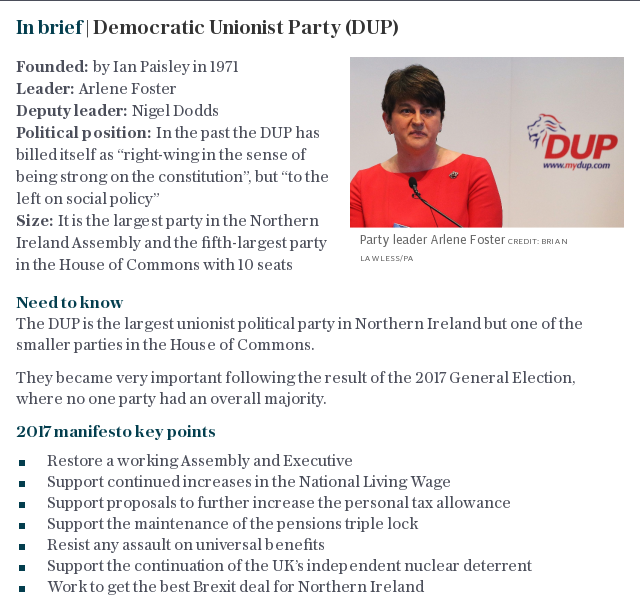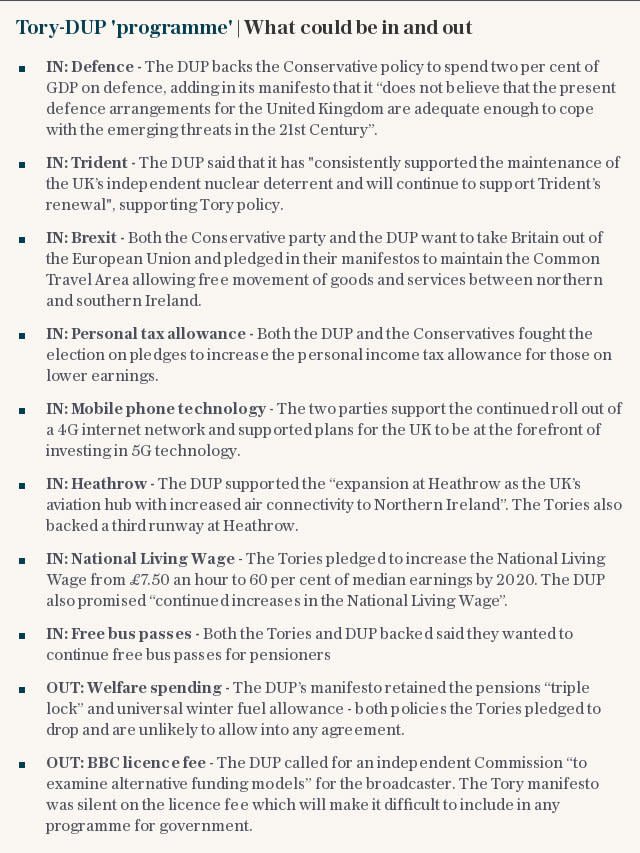What are confidence and supply deals and what does the DUP want?

Prime Minister Theresa May and Democratic Unionist Party leader Arlene Foster are holding discussions as they look to strike a deal to prop up a minority Conservative government.
The Conservatives won 318 seats in last week's election, eight short of a majority, and therefore need the support of at least one other party to pass key legislation in Parliament.
But unlike the Conservative-Liberal Democrat coalition in 2010, where the parties agreed on a full legislative agenda with representatives from both in ministerial offices across government, the deal between the Tories and the DUP is more likely to be a so-called "confidence and supply agreement".

Here are some questions and answers about the potential deal.
What is a confidence and supply agreement?
A minority party has an agreement with another party or parties to ensure it wins votes of confidence - generally considered on the Queen's Speech and on the Budget.
It can keep a government up and running but still leads to day-to-day instability as each "normal" vote is held against the backdrop of the governing party being a minority.
Why is it called a confidence and supply deal?
The "confidence" is a reference to backing on votes of no confidence while "supply" refers to backing on bills required for the Government to receive money to carry out its agenda.
Have we ever seen a similar deal in UK politics before?
The Lib-Lab pact from 1977 allowed Labour prime minister James Callaghan to remain in office after a by-election defeat saw the party lose its majority.
The Labour Party accepted a number of Liberal policies in exchange for support in motions of no confidence, with the deal lasting 18 months.
What's in it for the Conservatives?
The Prime Minister will be desperate to get agreement from the DUP to back her legislative programme in the House of Commons or risk her government falling.
Mrs May's authority has been severely diminished after a disastrous general election which saw her lose her Commons majority and a deal with the DUP looks vital for the continuation of Tory rule.
It will allow the party to continue to govern without having to give up too much of their manifesto or Cabinet posts, which would be the case in a formal coalition.

What's in it for the DUP?
Ahead of meeting Mrs May in Downing Street, Democratic Unionist Party (DUP) leader Arlene Foster has kept her wish list firmly tucked in her pocket, giving few details away.
However, an analysis of her party's position on key issues and its stated objectives in recent election manifestos provide clues as to where the Tories may have to give ground to secure a deal to keep them in power.
Foster, the DUP leader, is keen to avoid a hard border with Ireland and has spoken against a "hard Brexit."
It will come as no surprise if the DUP seeks more money for Northern Ireland as the price for its support. In what form such investment takes will be up for negotiation.

The DUP wants to see the triple lock on pensions retained. It is also against any move to limit those who can receive the winter fuel allowance.
The DUP also supports a recent recommendation from Westminster's Defence Committee that a statute of limitations be introduced when it comes to prosecuting security force members who served during the Troubles.
Having helped deliver a number of major events to Northern Ireland, such as the Giro d'Italia and golf's Open Championship, the DUP may ask for support hosting other high-profile international show-pieces.
The DUP's social conservatism on issues such as gay marriage and abortion have come in for a lot of scrutiny since it assumed the role of parliamentary kingmaker. However, it is unlikely these will feature in the negotiations with the Conservatives.
Are confidence and supply deals used elsewhere in the world?
Yes, the National Party in New Zealand fell two seats short of a majority at the last election in September 2014 and struck a confidence and supply arrangement with the Maori party to run the country as a minority government.

 Yahoo News
Yahoo News 
